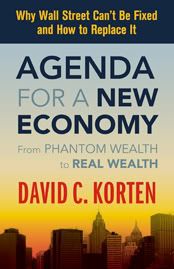"We face a monumental economic challenge that goes far beyond anything being discussed in the U.S. Congress or the corporate press. The hardships imposed by temporarily frozen credit markets pale in comparison to what lies ahead.
Even the significant funds that the Obama administration is committed to spending on economic stimulus will do nothing to address the deeper structural causes of our threefold financial, social, and environmental crisis. On the positive side, the financial crisis has put to rest the myths that our economic institutions are sound and that markets work best when deregulated. This creates an opportune moment to open a national conversation about what we can and must do to create an economic system that can for work for all people for all time."
Internationally renowned social scientist and historian David Korten wrote those words in the introduction of his new book, Agenda For A New Economy: From Phantom Wealth To Real Wealth, scheduled to be released by Berrett-Kohler Publishers tomorrow.
Some of you may have previously read Korten's 1995 international bestseller, When Corporations Rule the World. Longtime readers/listeners of the Intrepid Liberal Journal may also recall my August 2007 podcast interview with Korten about his book, The Great Turning: From Empire To Earth Community. You can learn more about Korten's background by clicking here and reading the introductory text to that podcast.
Korten's current book is organized in four parts: Part I, The Case for a New Economy; Part II, The Case for Eliminating Wall Street; Part III, Agenda for a Real Wealth Economy and Part IV, Change the Story, Change the Future. Essentially, Korten divides the economy into "Wall Street" and "Main Street." The first half of Korten's book is dedicated to indicting Wall Street for generating "phantom wealth" at the expense of society's quality of life. In the second half, Korten promotes twelve concepts to empower a "Main Street" economy that facilitates the exchange of tangible goods and services among citizens living within their means.
His diagnosis and prescriptions are jarring. Korten postulates that Main Street is far closer to the original vision of Adam Smith while Wall Street capitalism is the antithesis of a free market economy. Reform-minded liberals, who believe we can work within America's established financial credit markets banking system and stabilize our economy with band-aids and bailouts, will likely be just as opposed to his book as Wall Street apologists. Conservatives will likely dismiss Korten's solutions because he believes in government regulation to ensure that businesses and citizens behave within agreed upon social norms.
As Korten sees it, corporations in a Wall Street economy are given incentives to destroy the planet's environment and inflate its financial statements by taking a wrecking ball to the middle class. In a true market economy, business entities that inflict harm on the environment and their community's overall quality of life could not survive. Hence, Korten writes that under a Wall Street economy, corporations,
Some of you may have previously read Korten's 1995 international bestseller, When Corporations Rule the World. Longtime readers/listeners of the Intrepid Liberal Journal may also recall my August 2007 podcast interview with Korten about his book, The Great Turning: From Empire To Earth Community. You can learn more about Korten's background by clicking here and reading the introductory text to that podcast.
Korten's current book is organized in four parts: Part I, The Case for a New Economy; Part II, The Case for Eliminating Wall Street; Part III, Agenda for a Real Wealth Economy and Part IV, Change the Story, Change the Future. Essentially, Korten divides the economy into "Wall Street" and "Main Street." The first half of Korten's book is dedicated to indicting Wall Street for generating "phantom wealth" at the expense of society's quality of life. In the second half, Korten promotes twelve concepts to empower a "Main Street" economy that facilitates the exchange of tangible goods and services among citizens living within their means.
His diagnosis and prescriptions are jarring. Korten postulates that Main Street is far closer to the original vision of Adam Smith while Wall Street capitalism is the antithesis of a free market economy. Reform-minded liberals, who believe we can work within America's established financial credit markets banking system and stabilize our economy with band-aids and bailouts, will likely be just as opposed to his book as Wall Street apologists. Conservatives will likely dismiss Korten's solutions because he believes in government regulation to ensure that businesses and citizens behave within agreed upon social norms.
As Korten sees it, corporations in a Wall Street economy are given incentives to destroy the planet's environment and inflate its financial statements by taking a wrecking ball to the middle class. In a true market economy, business entities that inflict harm on the environment and their community's overall quality of life could not survive. Hence, Korten writes that under a Wall Street economy, corporations,
Sphere: Related Content"If it were a real person, it would fit the clinical profile of a sociopath."





No comments:
Post a Comment